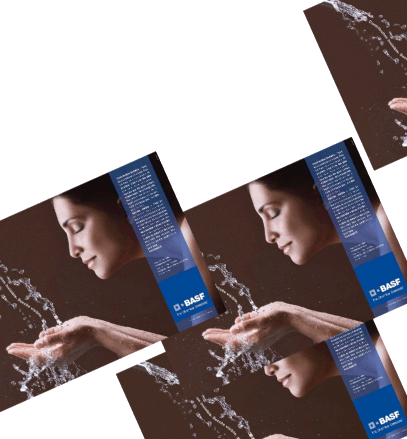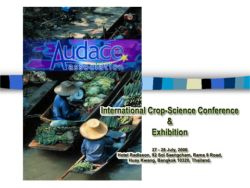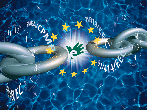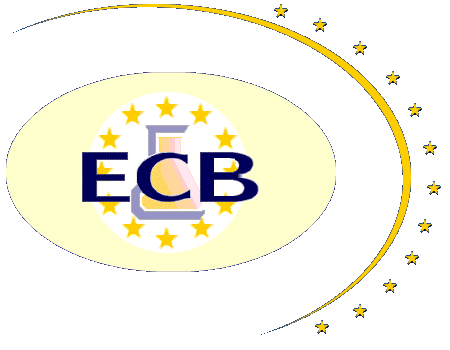|
|
water integrity and business ethic
compromise or modern Machiavellianism ?
the story

BASF et le chloridazon :
un exemple d'une logique industrielle, commerciale
et durable contre la santé et l'environnement
lire le dossier
|
ECPA celebrates World Water Day 2007
ECPA 22 March
European crop protection industry strongly supports
anti-counterfeit measures by authorities and others
ECPA 29 March
Industry calls on MEPs to encourage innovation in PPPs
ECPA 8 February
ECPA welcomes innovative Marker technology in the fight against illegal
and counterfeit plant protection products
ECPA 27 February
Le projet CRISTAL, lancé en 1998 par le European Crop Protection
Association (ECPA) .....
La traçabilité, pour faire quoi !
Traceability forseen by ECPA, ... enforced in Belgium
AUDACE's presentation at the
« CROP
PROTECTION Generics, Patents and Parallel Trade Summit 2006 » conference
at the Hilton, Amsterdam :

click in the
picture
AUDACE's intervention focussed on the
following :
"Users,
distributors and producers of PPP in the context of parallel trade :
§
The
limits of the « Kohlpharma » case.
§
The
parallel import within the framework of the concept of zonal marketing
authorization (MA) and mutual recognition."
"L'utilisateur,
le distributeur, le producteur de PPP dans le contexte des importations
parallèles :
Les
limites de la jurisprudence "Kohlpharma".
L'importation
parallèle dans le cadre du concept de l'autorisation de mise sur le marché
(AMM) zonale et de la reconnaissance mutuelle.
Permethrin and acephate two active substances imported illegally by BASF
in the US
(U.S. EPA Enforcement and Compliance Update,September 18, 2001; U.S. EPA
Civil Complaint, FIFRA-04-2001-3000, September 11, 2001)
In September 2001, the U.S. Environmental
Protection Agency (EPA) charged MicroFlow, BASF’s wholly owned
subsidiary in the US with importing and selling millions worth of
illegal, counterfeit pesticides in the U.S. over a several year period,
a case of 673 separate violations of the U.S. Federal Insecticide,
Fungicide, Rodenticide Act.
EPA's determined that the company offered plant protection products
(PPP) for sale whose composition differed from the specification in
their marketing authorisation (MA). EPA also charged that Micro Flo
falsified notices accompanying shipments of active substances claiming
that they were produced by an EPA-approved producer.
In
reality, the imported chemicals were from foreign companies whose
products were not approved by EPA.
United Phosphorus (UPL), a producer of acephate and permethrin based in
Warrington (UK) with production plants in India sued BASF and Micro Flo
for fraudulently using its name and marketing authorisation proprietary
data.
Perméthrine et acéphate deux substances actives importées illégalement
aux Etats Unis par BASF
(U.S. EPA Enforcement and Compliance Update,September 18, 2001; U.S. EPA
Civil Complaint, FIFRA-04-2001-3000, September 11, 2001)
En septembre 2001, le Ministère de l'Environnement américain (EPA)
inculpait Microflo, filiale à 100% de BASF'S aux EU pour l'importation
et la vente de millions de dollars de produits phytopharmaceutiques
contrefaits aux Etats-Unis pendant une période qui couvre plusieurs
années, un cas de 673 violations séparées du « Federal Insecticide,
Fungicide, Rodenticide Act » amréricain (FIFRA).
L’agence américaine de l’environnement a établi que la société avait mis
sur le marché américain des produits phytopharmaceutiques (PPP) dont la
composition différait des spécifications dans leur dossier
d’autorisation de mise sur le marché (AMM). EPA a également inculpé
Micro Flo pour des écrits falsifiés qui accompagnaient les expéditions
de substances actives revendiquant qu'elles étaient fabriquées par un
producteur autorisé par EPA.
En réalité, les produits chimiques importés venaient de sociétés
étrangères dont les productions n’avaient pas été homologuées par EPA.
United Phosphorus (UPL), un producteur d'acéphate et de perméthrine basé
à Warrington (ROYAUME-UNI) avec des usines en Inde a poursuivi en
justice BASF et Micro Flo pour avoir frauduleusement utilisé son nom et
ses données protégées relatives aux dossiers d’autorisation de mise sur
le marché.
BASF
et le chloridazone :
un exemple d'une logique industrielle, commerciale et durable contre
la santé et l'environnement
water integrity and business ethic
BASF and chloridazon :
an example of a
sustainable commercial and industrial logic against health and the environment
TGI
de Saint Gaudens
the Witch Hunt
Chasse aux Sorcières
De l'art de ma
rcher
sur la tête
The World Turned
Upside Down
Marketing vert
Green marketing

Assoção Dos Usuários E Distribuidores De Agro-Quimicos Europa

J'aide AUDACE
J'adhère à AUDACE !

to help AUDACE
I join AUDACE !
POLAND
Parallel Imports
Zrzeszenie Użytkowników i Dystrybutorów Europejskiej Agrochemii
AUDACE
-
Import równoległy, a wspólne pochodzenie.
Obserwacje w stosunku do decyzji Trybunału w sprawie C-201/06 z dnia 21
lutego 2008.
-
Trybunał Sprawiedliwości Unii Europejskiej
IMPORT INDYWIDUALNY ŚRODKÓW OCHRONY ROŚLIN W HANDLU RÓWNOLEGŁYM PRZEZ
ROLNIKÓW
Import środków ochrony roślin przez użytkowników, rolników i ogrodników
amatorów w granicach ich potrzeb osobistych
-
Na podstawie ustawy z 1 lipca 1901 i dekretu z 16 sierpnia 1901 zostaje
utworzone zrzeszenie o nazwie:
ZRZESZENIE UŻytkownikŌw i DystrybutorŌw Europejskiej Agrochemii
w skrócie :
A.U.D.A.C.E *
STATUT
ASIA
PMFAI conference
AUDACE's presentation at the
«
International
Crop-Science Conference & Exhibition 2006
» the
Radisson, Bangkok :

click in the
picture
|
|
March
2008
                     
' Common origin '
C-201/06
 |
|
FR
NL -
PL
Observations relatives à l'arrêt rendu par la Cour le 21 février
2008 dans l'affaire C-201/06
Importations parallèles
: origine commune
II ressort des commentaires déjà exprimés sur cet arrêt que la
Cour aurait définitivement statué sur l'obligation d'origine
commune entre le produit importé et le produit de référence.
Or, si la réglementation française peut effectivement exiger que
le produit importé et celui déjà autorisé en France aient une
origine commune, il n'en reste pas moins qu'en cas d'origines
différentes les autorités nationales peuvent toujours utiliser
pour le produit importé l'évaluation de la sécurité et de
l'efficacité réalisée pour le produit de référence si cette
utilisation ne présente aucun risque pour la santé publique et si
les produits ne présentent aucune différence significative aux
fins de l'évaluation de leur sécurité et de leur efficacité bien
qu'ils aient été fabriqués par deux entreprises distinctes.
Aucune raison tirée de la protection de la santé publique ne
s'oppose à ce que cette règle soit applicable aux produits
phytopharmaceutiques dans la mesure où la législation
communautaire vise à assurer un haut niveau de protection de la
santé humaine.
Tel est incontestablement le cas des produits contenant seulement
des substances actives inscrites à l'annexe I de la directive
91/1414/CEE et dont l'examen comparatif de la formulation ne
nécessite pas la mise en œuvre de la procédure prévue à l'article
10 de la directive pour la reconnaissance mutuelle des AMM.
Telle est précisément la position que la France a défendue a
contrario devant la Cour dans cette affaire et telle est
concrètement l'alternative utilisée par I'AFSSA en 2007 pour au
moins trois demandes d'importation parallèle sans origine commune.
05 mars 2008
|
|
EN
Observations relating to the ECJ judgment in case C-201/06 of
February 21st, 2008
Parallel imports : common origin
It emerges from opinions and reactions already expressed on this
judgment that the Court would have ruled definitively on the
requirement of common origin between the imported product and the
reference product.
Now, if French regulations effectively may require the imported
product and that already authorised in France to have a common
origin, nonetheless in case of different origins the national
authorities may still, for the purpose of assessing the imported
product’s safety and efficacy use the evaluation made of the
reference product if this use does not put at risk the public
health and if the relevant products have no meaningful difference
for the purpose of evaluating their safety and their efficacy even
though they are made by two unrelated companies.
No reason deriving from the protection of public health precludes
that this rule be applicable to plant protection products in so
far as the community legislation aims at insuring a high level of
protection of the public health.
Indisputably such is the case of products containing only active
substances included in the annex I of directive 91/1414/EEC and
for which the comparative assessment of the formulation does not
require implementing the mutual recognition of MA procedure
provided for in article 10 of the directive.
Such is precisely the point of view which France defended from a
contrary position in this case before the Court and such is, in
concrete terms, the alternative used by AFSSA (French Food Safety
Agency) in 2007 for at least three applications for parallel
import MA without common origin.
March 5th, 2008 |
|
NL
Kennisgeving aangaande het besluit van het Europees gerechtshof in
de zaak C-201/06 van 21 februari 2008.
Parallel import:
gemeenschappelijke oorsprong.
Het bleek reeds uit de geleverde commentaren op dit arrest dat het
Gerechtshof een definitief oordeel had willen vellen over de
noodzaak van de gemeenschappelijke oorsprong tussen het
geïmporteerde product en het referentieproduct.
Indien de franse wet inderdaad kan eisen dat het geïmporteerde
product en het reeds toegelaten product in Frankrijk een
gemeenschappelijke oorsprong hebben, kan de overheid, in het geval
van niet een gemeenschappelijke oorsprong, voor de veiligheids- en
werkzaamheids-beoordeling van het geïmporteerde product toch de
gemaakte evaluatie van het referentieproduct gebruiken, indien dit
gebruik geen gezondheidsrisico’s meebrengt, en indien de producten
geen relevante verschillen hebben voor wat betreft de beoordeling
op het vlak van de veiligheid en werkzaamheid, en dit ook in het
geval de producten werden gemaakt door twee niet verwante
bedrijven.
Er is geen enkele reden gelieerd aan de bescherming van de
volksgezondheid die uitsluit dat deze regel niet van toepassing
zou zijn op gewasbeschermingsmiddelen, voor zover dat de hoge
beschermingsgraad voor de volksgezondheid gegarandeerd blijft.
Dit is ongetwijfeld het geval voor de producten die enkel actieve
stoffen bevatten die opgenomen zijn in Bijlage 1 van de Richtlijn
91/414/EEC, en waar voor het vergelijkende onderzoek van de
formulaties de wederzijdse toelatingsprocedure van artikel 10 van
de Richtlijn niet nodig is.
Dit is nu juist de stelling die Frankrijk verdedigde vanuit een
tegengestelde positie in deze gerechtszaak, concreet dit is het
alternatief gebruikt door het AFFSA (Frans voedselagentschap) in
2007, voor tenminste 3 toelatingen zonder gemeenschappelijke
oorsprong.
5 Maart 2008.
|
|
PL
Obserwacje w stosunku do decyzji Trybunału w sprawie C-201/06 z
dnia 21 lutego 2008.
Import równoległy, a wspólne pochodzenie.
Z
opinii i komentaży wyrażonych na temat wyroku, wnioskować można,
że Trybunał definitywnie ustanowił, by środek ochrony roślin
będący przedmiotem importu równoległego oraz produkt referencyjny
miały „wspólne pochodzenie”.
Reglamentacja francuska może wymagać, aby produkt importowany i
produkt referencyjny miały wspólne pochodzenie. W przypadku
różnych pochodzeń, organy władzy mogą użyć, w stosunku do produktu
importowanego, ocenę bezpieczeństwa i skuteczności wydaną do
produktu referencyjnego. Pod warunkiem, że jego użycie nie
przedstawia żadnego ryzyka dla zdrowia publicznego i, że obydwa
produkty, nie wykazały żadnych istotnych różnic w ramach tej
oceny, mimo, że zostały wyprodukowane przez dwa różne
przedsiębiorstwa.
Żaden
powód dotyczący ochrony zdrowia publicznego nie stoi na
przeszkodzie stosowaniu tej zasady do środków ochrony roślin,
w zakresie w jakim przepisy wspólnotowe znajdujące zastosowanie
w tej dziedzinie mają na celu zapewnienie wysokiego poziomu
ochrony zdrowia ludzi.
Tak
jest niezaprzeczalnie w przypadku środków, które zawierają
substancje aktywne zamieszczone w aneksie I wytycznej 91/414 i w
przypadku których egzamin porównawczy formuły, nie wymaga użycia
procedury przewidzianej w artykule 10 dyrektywy dotyczącej
wzajemnego uznania (ZDO).
Tego
punktu widzenia w danej kwestii broniła Francja przed Trybunałem i
taka jest konkretnie alernatywa, której użyła AFSSA (Francuska
Agencja Bezpieczeństwa Żywności ) w 2007 roku, w co najmniej
trzech podaniach o import równoległy bez wspólnego pochodzenia.
Asocjacja Użytkowników i Dystrybutorów AgroChemii w Europie AUDACE
|
|
|
|
June
2007
Article 49a – “parallel trade"
New article proposed by the Council working group
Regulation of the European Parliament and of the Council
concerning the placing of plant protection products on the market
(COM (2006) 338 final)
|
|
DE
Deutsch |
|
FR
Le 23 mai dernier les Etat membres de l’Union européenne réunis au
sein du Conseil sous la présidence allemande établissaient une
nouvelle version consolidée du projet de règlement pour remplacer
la directive 91/414/CEE incluant un article 49a relatif au « commerce
parallèle » des produits phytopharmaceutiques.
Déjà le 7 décembre 2001, dans le cadre du « Standing Committee
on Plant Health, » l’Etat membre Allemagne avait indiqué qu’il
ne tiendrait pas compte du document guide SANCO/223/2000 rev.9 et
qu’il souhaitait voir règlementer les importations parallèles par
une modification de la directive 91/414/CEE : « les
dispositions pour établir l'identité d'un produit, la définition
des obligations dans le chef de l'importateur et des Etats membres
ne sont pas traitées de manière appropriée dans un document guide. »
AUDACE pour sa part avait à maintes reprises, depuis l’atelier de
Corfou en juillet 2002 donné les raisons pour lesquelles, de son
point de vue :
-
le principe de libre circulation des PPP serait mieux encadré en
dehors de la directive dont les objectifs essentiels sont la
protection de la santé et de l’environnement,
-
s’il devait en être autrement, les modifications apportées au
cadre réglementaire communautaire devaient nécessairement se
conformer aux principes d’objectivité, de nécessité et de
proportionnalité et
-
les décisions de refus ou de retrait d'autorisation de mise sur
le marché (AMM) devaient être notifiées au titre de la décision
3052/95 ou de la directive 98/34 à fin de cohérence.
Le projet de règlement tel qu’aujourd’hui consolidé place les
opérateurs dans une totale insécurité judiciaire incompatible avec
les principes fondateurs du traité.
Le silence volontairement gardé sur la pratique du
reconditionnement total et celle du double étiquetage pour éluder
les zones potentiellement litigieuses avec le droit de marque
laisse l’importateur professionnel dans la certitude d’un
harcèlement judiciaire systématique.
Le silence gardé sur les importations de PPP réalisées par les
utilisateurs dans les limites de leur utilisation
personnelle renforce le déficit des cadres règlementaires
nationaux ce qui laisse généralement libre cours à une pratique
administrative répressive.
Le besoin
de réglementer ces trois pratiques – reconditionnement,
double étiquetage, importations personnelles – est d’autant plus
pressant qu’une récente jurisprudence communautaire relative au
médicaments (C-348/04) rend opposable
à l’importateur
l’absence d’avertissement préalable du titulaire de la marque
avant toute commercialisation y compris au cas du double
étiquetage. Cette obligation n’avait jusqu’alors jamais été mise
en œuvre en dehors des cas de reconditionnements totaux avec
réutilisation de la marque. Le caractère cyclique des marchés
phytopharmaceutiques rend cette mesure généralement difficilement
réalisable voire dans certains cas totalement impraticable.
AUDACE avait sur ce fait, dès le 09 mai dernier, sollicité des
autorités compétentes nationales et de l’industrie qu’elles
veuillent bien convenir avec les importateurs parallèles des
conditions dans lesquelles le double étiquetage et les
reconditionnements pourraient s’exercer dans le respect de la
propriété industrielle et commerciale et dans la préservation des
exigences essentielles.
AUDACE regrette l'absence de réponse de l'industrie (qui par
contre n'a pas hésité a appliquer immédiatement l'arrêt de la Cour
du 26 avril 2007 dans l'affaire C-348/04 contre des importateurs)
laquelle n'a pas même estimé utile de
demander sa participation à la conférence qu'elle organise pour
« toutes les parties intéressées » ce 7 juin à Bruxelles.
|
|
EN
On May 23rd of this year the member States of the European Union
within the Council under German presidency established a new
consolidated version of the project regulation to replace
directive 91/414/EEC thereby including an article 49a concerning
« parallel trade » in plant protection products.
Already on December 7th, 2001, during a meeting of the « Standing
Committee on Plant Health, » the member state Germany had
indicated that it would not take note of the guidance document
SANCO/223/2000 rev.9 and that it wished to see parallel imports
regulated through changes brought about in directive 91/414/EEC :
« the provisions for establishing identity of a product, the
definition of the obligations of importers and Member States are
not suitable to be dealt with in a guidance document »
AUDACE for its part had repeatedly and consistently, since the Corfu
workshop in July, 2002 given the reasons for which, in its view,
-
The principle of free movement of the plant protection products
PPP would be better regulated outside the directive the aims
and objectives of which are the protection of health and the
environment
-
If it were to be otherwise, the modifications brought to the
directive inevitably had to conform to the principles of
objectivity, necessity and proportionality and
-
decisions of refusal or withdrawals of marketing authorisation
MA had be notified in conformance with decision 3052 or with
directive 98/34 for coherence.
The project regulation as amended puts operators in a situation of
total legal uncertainty incompatible with the founding principles
of the treaty.
The fact that the project is silent on the practices of complete
repackaging and double labelling, voluntarily on
grounds relating to potential areas of conflict with trade mark
right, leaves the professional importer in the certainty of
systematic judicial harassing.
The fact that the project is silent on imports of PPP by users
within the limits of their personal needs reinforces the
deficit of national statutory regulations generally allowing for
more repressive administrative practices.
The need to regulate these three practices – repackaging, double
labelling, own use imports – is all the more pressing as a recent
community jurisprudence relating to Pharmaceutical products
(C-348/04)
makes it compulsory for the importer to give notice to the trade
mark owner and, on demand, supply him with a specimen of the
product before it is put on sale, in all cases including that of
the double labelling. This obligation had never been put into
practice except in cases of total repackaging with re-application
of the trade mark. Seasons and cycles are attributes of the plant
protection market that make this measure particularly difficult to
implement and in some cases totally impracticable .
On this account, AUDACE had, on May 09th, sought from the national
competent authorities and from the industry that they agree with
the parallel importers on the conditions in which double labelling
and repackaging could take place in accordance with industrial and
commercial property right and the preservation of the essential
requirements.
AUDACE
regrets the absence of any response from the industry ( except
for initiating legal actions based on C-348/04 against importers
for past imports… ) as it regrets its representative
organisation ECPA did not think it useful to call on AUDACE to
take part in the multi-stakeholder event it organises in Brussels
on the 7th June 2007 !
|
|
|
Droit de
marque - Conséquences de l’arrêt CJCE C-348/04 du 26 avril
2007
au cas des Importations Parallèles
( IP ) de Produits PhytoPharmaceutiques ( PPP )
communique audace du 09 mai 2007 (pdf 24
KB)
Plant Protection Products - Parallel Imports and
Pirating
The
industry's intense lobbying of the European parliament
aiming at discrediting importers as hucksters and unique
beneficiaries of this intra community business, or the
numerous communications revealing alleged figures of
counterfeit or illegally traded products are to be taken
with caution in the controversial context of the revision of
directive 91/414/CE.
PARALLEL IMPORTS AND PIRATING
En pdf
IMPORTATIONS PARALLELES ET CONTREFAÇONS
Fr pdf
Produits Phytopharmaceutiques - Importations Parallèles et
Contrefaçons
Dans toutes les commissions et groupes de travail, les
autorités compétentes et l’industrie considèrent que les
importations parallèles (IP) sont la cause exclusive des
fraudes sur les produits phytopharmaceutiques (PPP)
Il est temps de réagir à un tel sophisme.
DE
Vorschlag für eine VERORDNUNG DES EUROPÄISCHEN PARLAMENTS UND
DES RATES über das Inverkehrbringen von Pflanzenschutzmitteln
Am 23. Mai dieses Jahres haben die Mitgliedsstaten der
Europäischen Union im Rat unter der deutschen Präsidentschaft
eine neue konsolidierte Version einer geplanten Verordnung
verfasst, welche die Direktive 91/414/EEC ersetzen soll. Diese
schliesst §49a ein, der „Parallelhandel“ von
Pflanzenschutzmitteln regelt.
Bereits
am 7.
Dezember 2001, während einer Versammlung des «Ständigen
Ausschusses der Kommission für Pflanzengesundheit », hat
Deutschland als Mitgliedsstaat angedeutet, das Leitdokument
SANCO/223/2000 rev.9 nicht zu berücksichtigen und äusserte den
Wunsch, Paralllelimporte im Rahmen der Direktive 91/414/EEC
geregelt zu sehen: «…die Massnahmen um die Identität eines
Produktes festzulegen sowie die Definition der Pflichten eines
Importeurs und eines Mitgliedsstaates sind nicht dazu
geeignet, um in einer Richtlinie festgelegt zu werden…».
AUDACE für seinen Teil hat wiederholt und stetig - seit dem
Workshop von Korfu im Juli 2002- Gründe angebracht, nach deren
Ansicht
-
das Prinzip des freien Warenverkehrs von
Pflanzenschutzmitteln (PSM) besser ausserhalb der Direktive
geregelt wäre, da ihr die Prinzipien Schutz der Gesundheit
und der Umwelt zugrundeliegen,
-
falls dem nicht so sein sollte, die Änderungen der Direktive
den Prinzipien der Objektivität, Notwendigkeit und
Verhältmässigkeit entsprechen müssen
und
-
Entscheidungen hinsichtlich der Verweigerung oder der
Aufhebung von Vertriebsgenehmigungen mit der Bestimmung
3052/95 oder mit der Direktive 98/34 in Einklang stehen
müssen.
Die in dieser Form vorgeschlagene geplante Verordnung bringt
die Beteiligten in eine Situation vollständiger Ungewissheit,
die unvereinbar mit den Gründungsprinzipien des Vertrags (von
Rom) ist.
Die Tatsache, dass der Vorschlag keine Regelungen hinsichtlich
vollständigen Umpackens und doppelter Etikettierung vorsieht,
bringt den gewerblichen Importeur in eine juristisch
vollkommen ungewisse Situation, da Konflikte mit dem
Markenschutzrecht somit impliziert sind.
Die Tatsache, dass die geplante Verordnung sich nicht zu
PSM-Importen zum Eigenbedarf äussert, verstärkt den Mangel
gesetzlich
festgelegter Regelungen auf nationaler Ebene und
ermöglicht grundsätzlich repressive administrative Praktiken.
Es ist dringlich, die drei Themenbereiche Umpacken, doppelte
Etikettierung sowie Einfuhr zum Eigenbedarf zu regeln, zumal
auch die neuere gemeinschaftliche Rechtsprechung hinsichtlich
Arzneimitteln (C-348/04)
die Importeure verpflichtet, den Markeninhaber zu
benachrichtigten und ihm auf Anfrage ein Muster des Produktes
vor dem Inverkehrbringen zu überlassen, was für alle Fälle
–einschliesslich doppelter Etikettierung- gilt. Dieser
Verpflichtung wurde jedoch niemals nachgekommen, ausser in
Fällen vollständigen Umpackens und der erneuten Beantragung
des Markenamens. Im von Saisonalität und Periodizität
gekennzeichneten Markt für PSM sind solche Massnahmen nur
äusserst schwierig umzusetzen und machen den Parallelimport in
einigen Fällen sogar vollständig unmöglich.
Aus diesem Grunde hat AUDACE am 9. Mai die national
zuständigen Behörden und die Industrie aufgefordert zu einer
Einigung hinsichtlich der Bedingungen für doppelte
Etikettierung sowie Umpacken unter Berücksichtigigung des
industriellen und gewerblichen Eigentums sowie der Einhaltung
der notwendigen Auflagen mit den Parallelimporteuren zu
kommen.
AUDACE bedauert das Ausbleiben jeglicher Rückmeldungen seitens
der Industrie (ausser der Einleitung rechtlicher Schritte
aufgrund C-348/04 gegen Importeure für Importe in der
Vergangenheit … ). Ebenso wird bedauert, dass die
vertretende Organisation ECPA es nicht für notwendig gehalten
hat AUDACE zu dem in Brüssel am 7. Juni stattfindenden
Veranstaltung verschiedener Interessenvertreter einzuladen.
|
|
Europe de la Pharma : Les
industriels se mobilisent
Arthur J.
Higgins, à la tête de la Fédération européenne des industries du
médicament (EFPIA) :
« … les importations parallèles ont également été
au centre des préoccupations. Le président de l'EFPIA a avancé
la nécessité de renforcer l'intégrité et la transparence de la
chaîne d'approvisionnement des médicaments, d'augmenter la prise
de conscience du public sur les risques de contrefaçons et enfin
d'accroître la traçabilité des produits pharmaceutiques. «
Il faut piloter un système qui facilite
la traçabilité de nos médicaments », a insisté le
président. »
http://www.pharmaceutiques.com/archive/une/art_1060.html
« The European pharmaceutical industry is to
attempt to curb the role of intermediaries who
buy its products in low-cost markets and resell
them at a profit where prices are higher, by
pushing to ban the repackaging of medicines.
Arthur Higgins, head of Bayer Healthcare and
president of the industry's European trade
association, told the FT he planned to
strengthen "the integrity and transparency of
our drug supply chain" as one of his top
priorities. »
|
|
 amending
directive 91/414/EEC: amending
directive 91/414/EEC:
see the following
pages :
included,
AUDACE's comments and observations on the proposals for
Regulation [ 2006/0136 ( COD ) - COM ( 2006 ) 388 final ]and
Directive [ 2006/0132 ( COD) - COM ( 2006 ) 373 final ]
relating to the marketing and sustainable use of Plant Protection
Products (PPP)
 (0,140 MB)
(0,140 MB) |
|
voir les
pages suivantes :
inclus, les
Commentaires et observations d'AUDACE sur les propositions
de règlement [ 2006/0136 ( COD )
- COM ( 2006 ) 388 final ] et
de directive [ 2006/0132 ( COD) - COM ( 2006 ) 373 final ]
concernant la mise sur le marché
et l'utilisation durable des Produits PhytoPharmaceutiques ( PPP ) (0,26 MB)
(0,26 MB) |
|
|
|
|

infolink
Erigone
PFLANZENSCHUTZMITTEL
PARALLELIMPORT
UND PRODUKTFÄLSCHUNGEN

Seitens aller
zuständigen Gremien und Arbeitsgruppen der Behörden und der Industrie
wird der Parallelimport (PI) als einzige Ursache für den Betrug bei
Pflanzenschutzmitteln (PSM) angesehen.
Es ist an der
Zeit, diesem Trugschluss entgegenzutreten.
Erstens, nicht
der Parallelimport ist der Grund für Betrug, sondern die Nachlässigkeit
der national zuständigen Behörden, insbesondere der französchen,
bezüglich der fehlenden Umsetzung einer geeigneten Regelung zum
gesetzeskonformen und ordnungsgemässen Umpacken importierter Produkte,
die mehrfach seitens AUDACE in den letzten 7 Jahren gefordert wurde.
Zweitens, Betrug
ist nicht einzig verbunden mit Parallelimport-bezogenen
Vertriebsgenehmigungen, was ein neulich aufgetretener Fall im
Vereinigten Königreich wiederum zeigen konnte. Hierbei war ein grosser
Hersteller von PSM betroffen, dessen europäische Niederlassungen
allesamt Mitglieder nationaler Handelsverbänden sind, die bei der in
Brüssel ansässigen ECPA in einem gemeinschaftlichen Dachverband
organisiert sind.
Gleichermassen
wäre es nicht akzeptabel zu behaupten, dass alle Inhaber von
Vertriebsgenehmigungen, die in aufwendigen Verfahren erlangt wurden,
gegen das Gesetz verstossen oder generell Parallelimport mit
Betrugsgefahr zu verbinden.
Die national
zuständigen Behörden sollten somit verpflichtet sein, alle Produkte, die
in Verkehr gebracht werden, sowie alle Marktteilnehmer gleichermassen
zu kontrollieren-unabhängig von der Art der Vertriebsgenehmigung.
Dasselbe gilt für
die vehemente Einflussnahme der Industrie beim Europäischen Parlament,
wobei beabsichtigt wird, die Importeure im Rahmen der Revision der
Direktive 91/414/CE zu diskreditieren, sowie die zahlreichen
Mitteilungen, die anschuldigendes Zahlen(material) zu gefälschten oder
illegal gehandelten Produkten enthalten.
M. O.
Den 10. Mai 2007

Portal
to national law

Portal
to European Union law
NEW
EURO-LEX

EU
directory
European
Court of Justice

EU
Parliament

Council
of the European Union
COMMISSION
Plant
health [en]
Phytopharmacie
[fr]
Pflanzenschutz
[de]

European
Chemicals Bureau
Directive
91/414/CEE
de
la conception à la mise en oeuvre
AEFISA
Asociación
Española de Fitosanitarios y Sanidad Ambiental
Secretary
Tel/Fax: + 34 93 318 74 25
Raúl
Nehring Andrade
Secretary
General
aefisa@fedequim.es
situation
aux USA
AEFISA
position paper

AENDA
Associação
Brasileira dos Defensivos Genéricos
Av. Doutor Vieira de Carvalho, 172 - 3° andar cj. 306
CEP: 01210-010 - Vila Buarque - São Paulo / SP
PABx: (11) 3354-0053 / Email: aenda@aenda.org.br
AUDACE
in Brazil


|
















